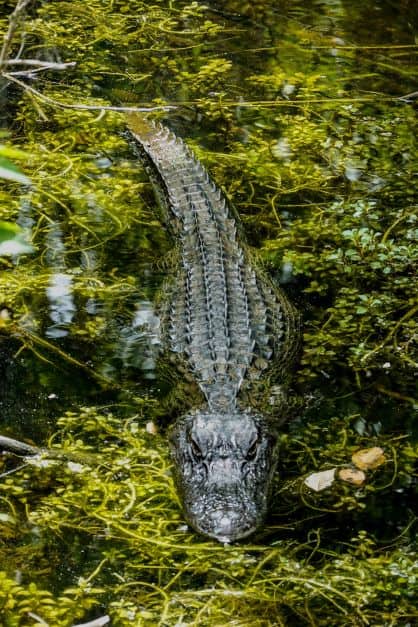
Wrongful Death Claim against Spanish Lakes Fairways
The family of Gloria Serge may have a case for a wrongful death claim against Spanish Lakes Fairways, and the companies that manage the 55-plus community in St. Lucie County. An alligator killed Serge on Monday, February 20, as she was walking her dog around a retention pond. If there was a lack of signage or warnings about the dangers of alligators at the property or a failure to search for and remove potentially dangerous alligators from the property, the family may be able to file suit.
According to a USA Today report, witnesses said 85-year-old Gloria Serge was walking her small dog close to the edge of the pond, when a 10-foot alligator erupted out of the water, grabbing the pet. As Serge attempted to pull the dog to safety, the alligator knocked her over, and pulled her into the water by her foot.
Alligator Caught and Euthanized
Emergency responders arrived at the scene within minutes and recovered her body, kept surveillance on the alligator with our helicopter and personnel around the lake, and assisted the Florida Fish and Wildlife Conservation Commission (FWC) trapper with identifying the alligator and dragging it out of the water, according to the article.
The animal was captured and euthanized by a nuisance alligator trapper. The gator was over 10-feet long and weighed an estimated 600-700 pounds.
Who Is Liable for an Alligator Attack in Florida?
Many questions remain to be answered about conditions surrounding the death of Gloria Serge. The question of legal liability after an alligator attack can be complex.
In an interview with CBS12’s Al Pefley, GOLDLAW’s Rafael Roca, a Board Certified Trial Lawyer, shed additional light on the duty owed by property owners to keep residents and visitors safe.
“They have a responsibility to maintain it in a reasonably safe condition, and not to expose those people to dangers that exist on the property that they have become aware of. It’s not unreasonable to not do anything about it. You have to take the proper precautions. It’s not reasonable to allow a ten- or eleven-foot alligator to live in a lake where there are residents that have dogs, cats and children, exposed to that type of condition.”
To determine legal liability for an alligator attack in Florida, it is important to establish what responsibility the property owner has to a victim. On private property, the property owner has a VERY HIGH duty to keep the premises safe for victims. A property owner may post warning signs that alligators are present, and that no swimming is allowed, but a sign may be legally inadequate. It is necessary for a property owner to inspect the property and take adequate measures to keep invited guests safe.
Once the legal standards that apply to the property owner have been established, the question of legal liability for an alligator attack comes down to the facts of each individual case. Just as the acts of a property owner are relevant, the actions of a victim are relevant too. If the property owner has not posted warning signs, or if the signs are vague in nature, the property owner may be liable.
The Comparative Negligence Rule
Legal liability comes down to the negligence/recklessness of each party, and the law examines the actions of each party to determine whose behavior may have led to the attack. It’s possible that BOTH a property owner and the victim can share legal liability for an alligator attack. While the property owner has a duty to protect residents/guests, a victim also has the duty to act reasonably and take steps to protect themselves.
In Florida, a system of comparative negligence is used to determine fault among parties. Even if the victim is partially to blame for the accident, they may still be able recover some damages if the accident is ALSO the fault of the property owner.
Residents Voice Concerns Over Alligators, but Attacks and Fatalities Are Rare
Charles Hermann, a neighbor of Gloria Serge, noted that residents are aware of the presence of the dangerous reptiles, who often come up out of the water to sun themselves on the banks of the ponds in the community.
“We’re used to seeing alligators, but they’re usually not doing anything,” he told reporters. “They just lay in the sun and so you wouldn’t expect it (an attack).”
According to the FWC, there are an estimated 1.3 million alligators in Florida, and can be found in all of the state’s 67 counties. Because public safety is a priority, Florida administers a Statewide Nuisance Alligator Program (SNAP) to proactively address alligator threats in developed areas, while conserving alligators in areas where they naturally occur.
People concerned about an alligator can call the Nuisance Alligator Hotline at 866-FWC-GATOR (392-4286). An alligator is considered a “nuisance” if it is at least four feet long and is believed to pose a threat to people, pets, or property. Between 1948 and 2021, there have been 442 documented unprovoked alligator attacks in Florida, resulting in 24 deaths since 1973.
Notice: As a personal injury law firm, we frequently provide legal analysis and opinion on news stories in the hope that the family and friends of the victims may gain some valuable insight into our theories of negligence surrounding the available facts. Respectfully, our hearts and thoughts are with those who have suffered a catastrophic injury or death.
If you would like a FREE, confidential consultation about an incident, please contact us today at (561) 222-2222.



